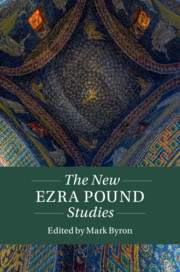Book contents
- The New Ezra Pound Studies
- Twenty-First-Century Critical Revisions
- The New Ezra Pound Studies
- Copyright page
- Contents
- Notes on Contributors
- Key to Abbreviations
- Editor’s Introduction
- Part I Pound’s Texts
- Part II Ezra Pound and Asia
- Part III Culture and Politics
- Chapter 11 The Transnational Turn
- Chapter 12 Pound, Gender, Sexuality
- Chapter 13 Italian Fascism
- Chapter 14 Late Cantos, ‘Aesopian Language’, States’ Rights and John Randolph of Roanoke
- Chapter 15 Copyright
- Chapter 16 The Temple and the Scaffolding
- Afterword
- Index
- References
Chapter 16 - The Temple and the Scaffolding
The Cantos of Ezra Pound and Digital Culture
from Part III - Culture and Politics
Published online by Cambridge University Press: 17 October 2019
- The New Ezra Pound Studies
- Twenty-First-Century Critical Revisions
- The New Ezra Pound Studies
- Copyright page
- Contents
- Notes on Contributors
- Key to Abbreviations
- Editor’s Introduction
- Part I Pound’s Texts
- Part II Ezra Pound and Asia
- Part III Culture and Politics
- Chapter 11 The Transnational Turn
- Chapter 12 Pound, Gender, Sexuality
- Chapter 13 Italian Fascism
- Chapter 14 Late Cantos, ‘Aesopian Language’, States’ Rights and John Randolph of Roanoke
- Chapter 15 Copyright
- Chapter 16 The Temple and the Scaffolding
- Afterword
- Index
- References
Summary
As the impact of the internet has rippled in ever larger circles over the past twenty-seven years, Pound’s presence on the web has slowly made itself felt: as web aggregators starting anthologizing poetry, selections from his work, particularly the shorter poems, were showcased on websites like Poetry Foundation, Bartleby.com or Poetry Archive. Universities, in their turn, began hosting modernist literature projects, such as PennSound in Philadelphia, where parts of Pound’s work are presented and commented on next to that of other modernist writers. Online libraries or book clubs hold scanned versions of the New Directions edition of The Cantos in closed access. Commentators publish their own work with extensive quotations in blogs or digital magazines, and artists upload artwork inspired by Pound and his poem. Wikipedia now boasts a long article on Pound himself, one on The Cantos and one on a ‘List of Cultural References in The Cantos’.
Keywords
- Type
- Chapter
- Information
- The New Ezra Pound Studies , pp. 257 - 270Publisher: Cambridge University PressPrint publication year: 2019

